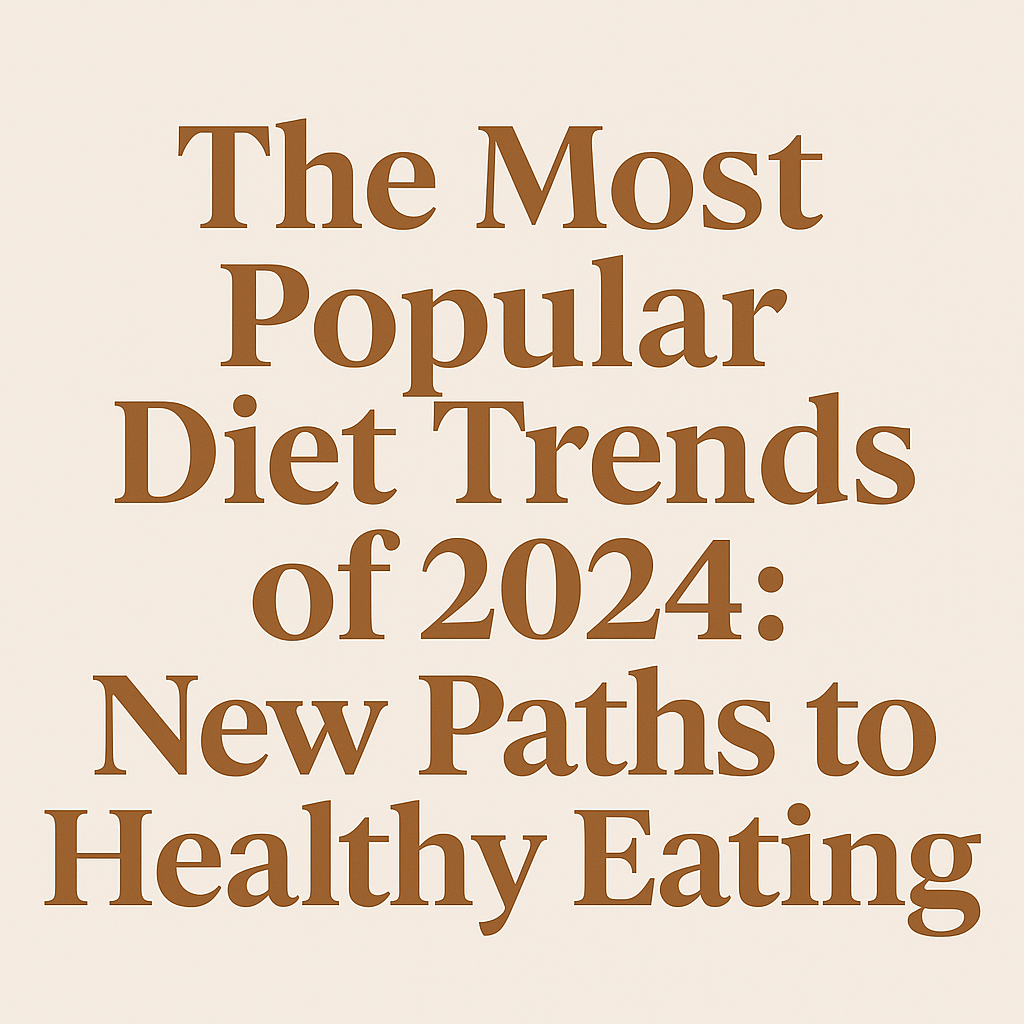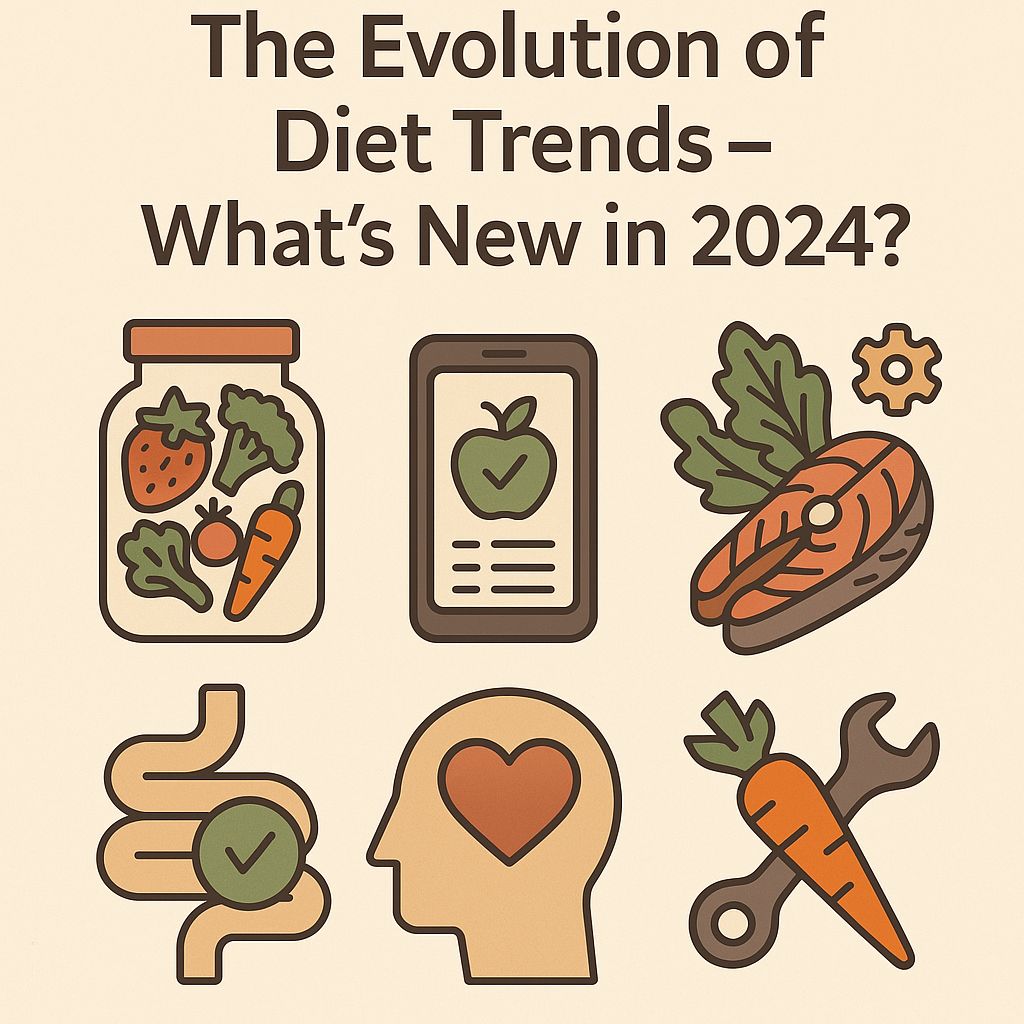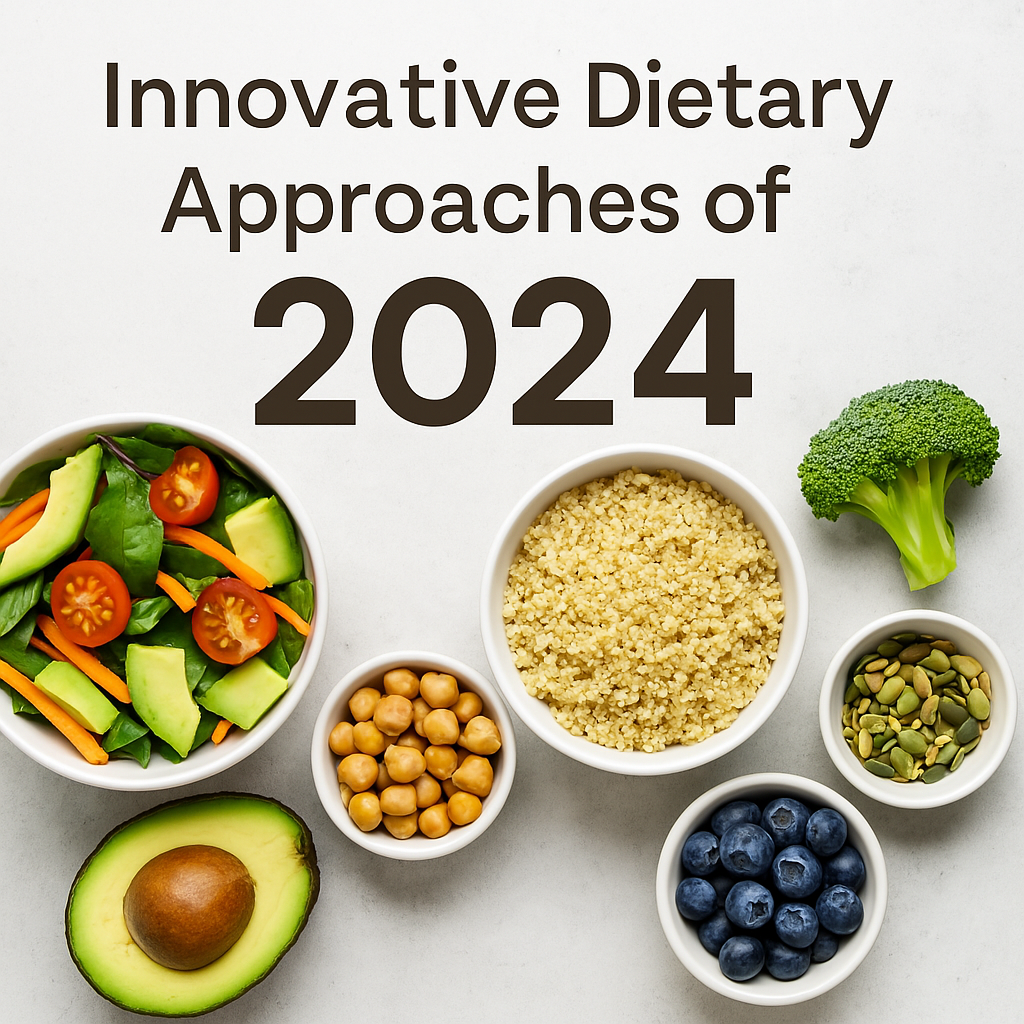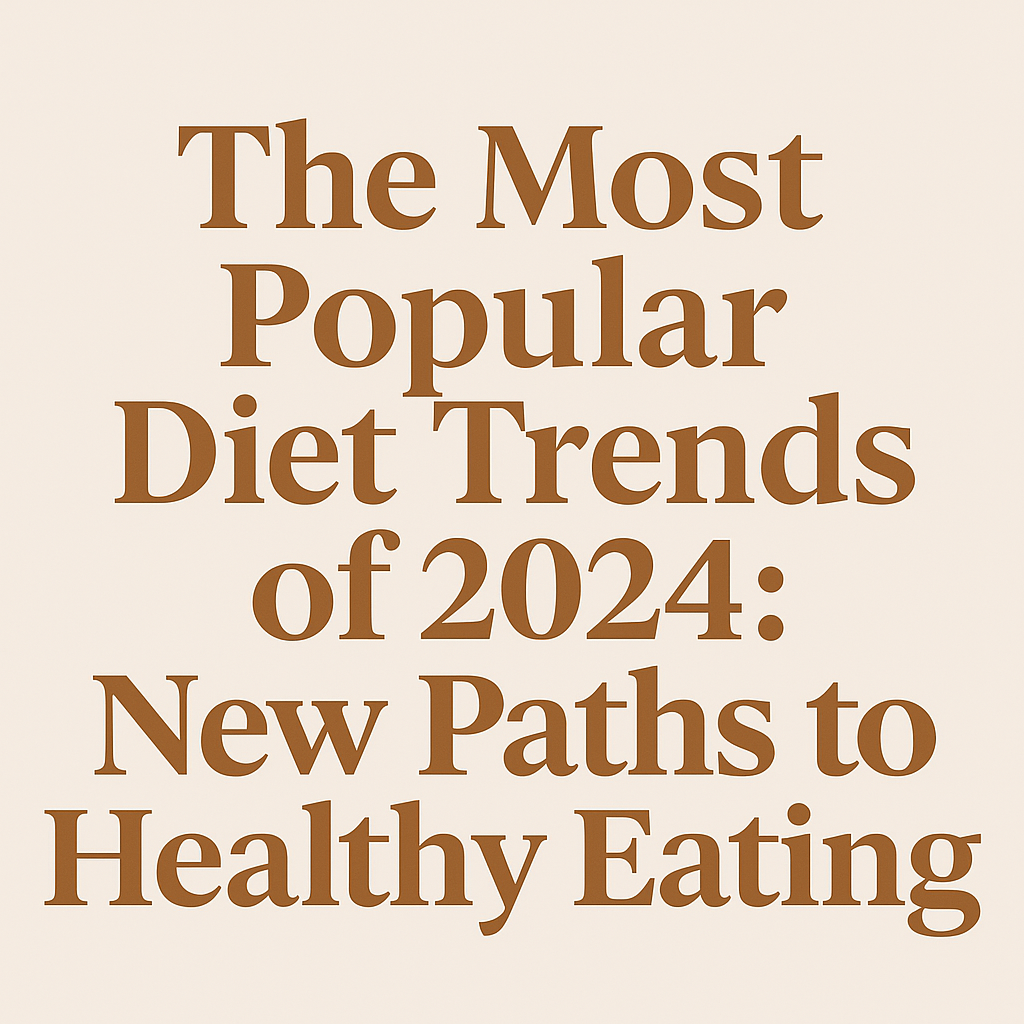
The world of nutrition and diet is constantly evolving, with new trends emerging every year as we learn more about what truly benefits our bodies and minds. In 2024, the focus continues to shift towards holistic health, personalized nutrition, and sustainable eating habits. Whether your goal is to lose weight, enhance mental clarity, boost immunity, or improve overall well-being, the latest diet trends offer something for everyone.
This comprehensive guide will cover:
- The most influential diet trends of 2024 and how they differ from previous years.
- Scientifically-backed benefits and potential drawbacks of each trend.
- Practical tips on incorporating these diets into your lifestyle.
- Expert opinions and research findings to guide your choices.
- How to customize popular diet trends to meet your individual needs and goals.
From the rise of plant-based eating and eco-friendly nutrition plans to innovative approaches like the dopamine diet and gut-health-focused regimens, 2024 promises to be an exciting year for those looking to improve their relationship with food. Let’s explore these trends in detail and discover which ones might be right for you.
Chapter 1: The Evolution of Diet Trends – What’s New in 2024?

1.1 How Diet Trends Have Evolved Over the Years
Diet trends are not just about losing weight or building muscle anymore. They have evolved into a broader conversation about wellness, longevity, mental health, and sustainability. In previous decades, the focus was often on quick-fix diets that promised rapid weight loss, but many of these approaches were unsustainable and even harmful in the long run.
In recent years, we have seen a paradigm shift towards holistic health, where the primary goal is not just physical appearance but overall well-being. The trends of 2024 reflect this transformation, emphasizing individualized nutrition, ethical eating practices, and mental wellness.
Key Moments in Diet Evolution:
- 1980s: Low-fat diets dominated the market, with an emphasis on calorie restriction and fat-free products.
- 1990s: The rise of high-protein diets like the Atkins Diet, promoting weight loss through carbohydrate reduction.
- 2000s: Low-carb diets gained popularity, with the ketogenic diet becoming mainstream.
- 2010s: Plant-based diets emerged as a major trend, driven by ethical, environmental, and health concerns.
- 2020s: A focus on personalized nutrition, sustainability, mental health, and gut health.
In 2024, the trend towards personalization continues to grow, with consumers increasingly seeking diets tailored to their unique genetic makeup, lifestyle, and wellness goals. From wearable technology that tracks nutrient intake to customized meal plans designed for specific health concerns, the industry is embracing data-driven approaches.
1.2 The Biggest Diet Trends of 2024
As awareness about health and wellness continues to expand, new dietary trends are emerging to meet the diverse needs and preferences of individuals. Here are some of the most prominent trends that are expected to dominate the nutrition world in 2024:
1.2.1 Personalized Nutrition
Personalized nutrition is one of the most exciting trends of 2024. With advancements in genetic testing, microbiome analysis, and wearable technology, individuals can now receive tailored dietary advice based on their unique biology and lifestyle.
- What It Is: A customized approach to diet that considers an individual’s DNA, blood biomarkers, microbiome composition, and personal health goals.
- Benefits: Improved metabolic health, optimized nutrient intake, enhanced athletic performance, and reduced risk of chronic disease.
- Challenges: Requires access to advanced testing services and can be costly.
Personalized nutrition is reshaping how we think about food, encouraging individuals to move away from one-size-fits-all solutions and towards highly customized, data-driven approaches.
1.2.2 Gut Health-Focused Diets
Gut health continues to be a major focus in the nutrition world, with research linking a balanced gut microbiome to improved immunity, mental health, and overall well-being.
- What It Is: Diets that emphasize the consumption of prebiotics, probiotics, fermented foods, and fiber-rich vegetables to support a healthy gut.
- Benefits: Enhanced digestion, immunity, mood regulation, and nutrient absorption.
- Challenges: Can be difficult to maintain consistency if not properly planned.
Gut health-focused diets are particularly popular among those looking to address issues like irritable bowel syndrome (IBS), autoimmune conditions, and mental health disorders.
1.2.3 Dopamine Diet
The dopamine diet is designed to boost mood and motivation by prioritizing foods that increase dopamine levels—a neurotransmitter associated with pleasure, reward, and emotional regulation.
- What It Is: A diet that includes foods rich in tyrosine (an amino acid precursor to dopamine) such as fish, poultry, nuts, eggs, beans, and dark chocolate.
- Benefits: Enhanced mood, focus, motivation, and cognitive performance.
- Challenges: May not be suitable for those with certain health conditions or dietary restrictions.
This approach is particularly popular among individuals seeking to enhance mental clarity, productivity, and emotional well-being.
1.2.4 Flexitarianism
Flexitarianism is gaining traction as a sustainable and balanced approach to nutrition, allowing individuals to enjoy the benefits of plant-based eating without fully giving up meat.
- What It Is: A mostly vegetarian diet that allows for occasional meat or fish consumption.
- Benefits: Reduced environmental impact, improved heart health, weight management, and increased dietary flexibility.
- Challenges: May require careful planning to ensure adequate protein and nutrient intake.
Flexitarianism offers a pragmatic solution for those who wish to reduce their carbon footprint and improve health without adhering to restrictive dietary rules.
Chapter 2: Innovative Dietary Approaches of 2024

In this chapter, we explore more cutting-edge dietary approaches making waves in 2024. From technology-driven diets to holistic approaches that incorporate mental well-being, these trends are pushing the boundaries of conventional nutrition.
2.1 The Rise of AI-Powered Nutrition Apps
Artificial intelligence is revolutionizing how we approach nutrition by providing personalized, real-time advice based on individual health data. These apps utilize a combination of machine learning algorithms, biomarker analysis, and behavioral tracking to offer tailored recommendations designed to optimize health outcomes.
- How It Works: AI-powered nutrition apps collect data from wearable devices, fitness trackers, and personal health assessments. Information such as blood sugar levels, caloric intake, sleep patterns, activity levels, and even emotional states are analyzed to create a dynamic dietary plan.
- Benefits: Enhanced accuracy and personalization, continuous monitoring of health markers, customized meal suggestions, and real-time feedback. These apps can also provide nutrient deficiency alerts, suggesting foods that can help address specific health issues.
- Popular Examples: Apps like MyFitnessPal, Nutrino, HealthifyMe, and Foodvisor have been integrating AI technologies to enhance user experience. However, 2024 introduces a new wave of more advanced platforms that include DNA-based nutrition advice, metabolic optimization, and emotional well-being support.
- Challenges: While AI-driven diets offer numerous benefits, potential drawbacks include privacy concerns, accessibility issues, and the reliability of collected data. It’s essential for users to choose reputable platforms with robust data security measures.
This technological advancement is particularly appealing to those who want precision in their nutritional choices. As these tools become more sophisticated, they will likely play a pivotal role in shaping how individuals approach diet and wellness in 2024 and beyond.
2.2 The Integration of Mental Health and Nutrition
Mental health is increasingly recognized as a crucial component of overall wellness, and dietary trends in 2024 are reflecting this awareness. Researchers have long acknowledged the gut-brain connection, but the latest approaches take things further by creating comprehensive dietary plans that address both physical and mental well-being.
- Nutritional Psychiatry: A growing field focusing on how diet influences mood, cognition, and mental health. Studies show that certain diets, rich in omega-3 fatty acids, antioxidants, B vitamins, and probiotics, can positively impact mood disorders like depression and anxiety.
- Mood-Boosting Diets: Incorporating foods that promote dopamine and serotonin production, such as bananas, nuts, seeds, fish, and dark chocolate. The dopamine diet, which prioritizes such foods, continues to gain popularity.
- Stress-Reducing Nutrition Plans: Tailored diets designed to reduce cortisol levels, improve sleep, and enhance relaxation. Popular strategies include the Mediterranean diet, plant-based diets, and high-fiber eating plans.
- Digital Mental Health Platforms: Apps that merge nutritional advice with mindfulness and cognitive-behavioral therapy (CBT). These tools help users track emotional eating patterns, stress triggers, and psychological responses to certain foods.
Conclusion
As we move deeper into 2024, it’s clear that the landscape of nutrition and dietary trends is undergoing a significant transformation. The focus is no longer just on achieving a certain body type or following restrictive meal plans. Instead, the world is embracing a more holistic, individualized, and ethically conscious approach to health and wellness.
The rise of personalized nutrition, AI-powered dietary plans, and mental health-integrated diets reflects a growing awareness that every individual’s needs are unique. The age of one-size-fits-all diets is slowly fading away, making room for data-driven, customized approaches that cater to personal health goals, genetic makeup, lifestyle, and emotional well-being.
Moreover, the emphasis on sustainability and ethical eating practices shows that people are beginning to understand the interconnectedness of personal health and planetary health. Choosing diets that are not only good for the body but also environmentally responsible has become a powerful motivator for many consumers. The growing popularity of plant-based diets, flexitarianism, and eco-friendly nutrition plans demonstrates a collective shift towards making healthier and more sustainable food choices.
Equally important is the incorporation of mental health into dietary approaches. Nutrition is increasingly being recognized as a vital factor in managing mental well-being, enhancing cognitive function, and promoting emotional resilience. The acknowledgment of the gut-brain connection and the development of nutritional psychiatry are ushering in a new era where dietary choices are seen as integral to overall mental and physical health.
However, the integration of technology into nutrition is perhaps the most groundbreaking change. As AI-driven nutrition apps continue to advance, they promise a future where dietary recommendations are not only tailored to individual needs but are also constantly updated based on real-time health data. This level of precision and personalization has the potential to revolutionize how we approach nutrition, making it more effective, efficient, and accessible.
Despite these exciting advancements, it’s essential to approach new trends with caution and critical thinking. Not every diet will work for everyone, and misinformation can be a persistent challenge. It is crucial to consult healthcare professionals, stay informed about credible research, and prioritize long-term health over quick fixes.
Ultimately, the most successful diet trends of 2024 are those that encourage balance, sustainability, personal satisfaction, and adaptability. Whether you are drawn to high-tech nutrition solutions, eco-conscious diets, or mind-body integration, there is a path to health and wellness that aligns with your unique preferences and lifestyle.
As we continue to explore these trends, it’s essential to remain flexible and open-minded. The future of nutrition is not about adhering strictly to any one diet but rather about finding what works best for you. By staying informed, experimenting with different approaches, and listening to your body’s needs, you can create a sustainable, enjoyable, and effective dietary plan that will enhance your health and happiness for years to come.
The world of nutrition is evolving faster than ever, and those who embrace this journey with curiosity and enthusiasm will undoubtedly reap the rewards of a healthier, more fulfilling life.

